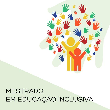Banca de DEFESA: LAUDIANE SILVA DE OLIVEIRA FERREIRA
Uma banca de DEFESA de MESTRADO foi cadastrada pelo programa.DISCENTE : LAUDIANE SILVA DE OLIVEIRA FERREIRA
DATA : 30/09/2024
HORA: 14:00
LOCAL: Via Google Meet - https://meet.google.com/ncd-ipyf-ebo
TÍTULO:
MATHEMATICS TEACHING AND INTELLECTUAL DISABILITY: CONCEPTIONS OF TEACHERS IN THE FINAL YEARS OF ELEMENTARY EDUCATION IN A PUBLIC SCHOOL IN MATO GROSSOPALAVRAS-CHAVES:
Inclusion, Intellectual Disability, Mathematics Teaching
PÁGINAS: 96
GRANDE ÁREA: Ciências Humanas
ÁREA: Educação
SUBÁREA: Tópicos Específicos de Educação
ESPECIALIDADE: Educação Especial
RESUMO:
This investigative research reflects on the role of the mathematics teacher and the way in which he encourages the participation of students with intellectual disabilities in the school environment, considering the limitations of the individual being trained. Its main objective is to analyze how students with intellectual needs are included in the teaching and learning process in the mathematics discipline. This dissertation aims to answer the following question: “How can the mathematics teacher contribute to the process of including students with intellectual disabilities in the classroom environment, for the construction of knowledge? The theoretical references researched served to highlight significant and necessary improvements in different school contexts of Elementary School II in the public network. This is descriptive qualitative research, with a case design, which involved the study with teachers working in Elementary School II at a state school in the city of Jauru - MT. The instruments used for data collection were closed and open questionnaires applied to mathematics teachers at the Deputado João Evaristo Curvo State School. The analysis of the collaborators' responses made it possible to infer that, even in the face of the structural difficulties faced in the performance of inclusive education, teachers are able to promote small curricular adaptations for students with intellectual disabilities and seek to use innovative methodologies, especially with the use of play. and, which are capable of promoting meaningful learning.
MEMBROS DA BANCA:
Presidente - 94289008 - CHIARA MARIA SEIDEL LUCIANO DIAS
Interna - 253540001 - ARIELE MAZOTI CRUBELATI
Externo à Instituição - THIAGO BEIRIGO LOPES - IFMT



